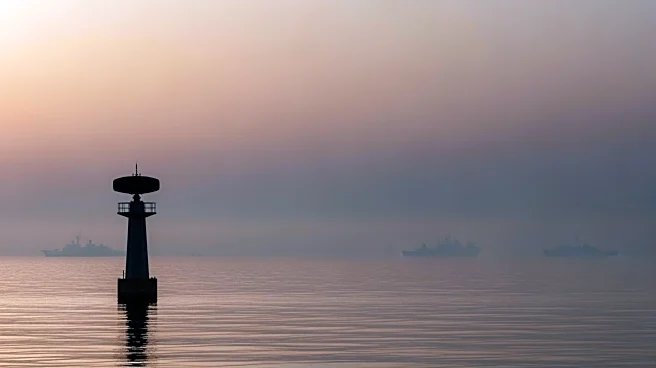What's Happening?
The UK Ministry of Defence has reported a significant increase in Russian naval activity in UK waters, noting a 30% rise over the past two years. This increase includes sightings of Russian vessels such
as corvettes and tankers transiting the English Channel. Recently, the Royal Navy dispatched HMS Severn to shadow a Russian corvette and tanker as they traveled through the Dover Strait. The Ministry highlighted the ongoing surveillance efforts, including the deployment of HMS Somerset and RAF maritime patrol aircraft to monitor Russian activities. The Ministry also accused a Russian spy ship of disruptive behavior, including GPS jamming and directing lasers at RAF planes.
Why It's Important?
The increased Russian naval presence in UK waters underscores the strategic importance of the English Channel and surrounding areas. This development has prompted the UK to bolster its defense capabilities, including a significant increase in defense spending. The heightened surveillance and monitoring efforts reflect the UK's commitment to maintaining security and stability in its maritime borders. The situation also highlights the broader geopolitical tensions between the UK and Russia, with potential implications for NATO and European security dynamics.
What's Next?
The UK Ministry of Defence is likely to continue its enhanced surveillance and monitoring of Russian naval activities. The Royal Navy and RAF are expected to maintain their readiness to respond to any further incidents. Additionally, the UK may engage in diplomatic efforts to address the situation with Russia, potentially involving NATO allies to ensure coordinated responses. The ongoing developments may also lead to further investments in defense technology and capabilities to counter potential threats.
Beyond the Headlines
The increased Russian naval activity raises questions about the broader geopolitical strategies of Russia in European waters. The incidents may reflect Russia's intent to assert its presence and influence in the region, challenging the security frameworks established by NATO and European nations. The situation also highlights the importance of international maritime law and the need for diplomatic channels to address potential conflicts and ensure safe navigation in international waters.











